Coronavirus Australia: Annastacia Palaszczuk’s regional quarantine plan slammed
Victorians who isolated in a Queensland hotel plagued by the UK COVID variant will be tested again, as a new regional quarantine plan was attacked.
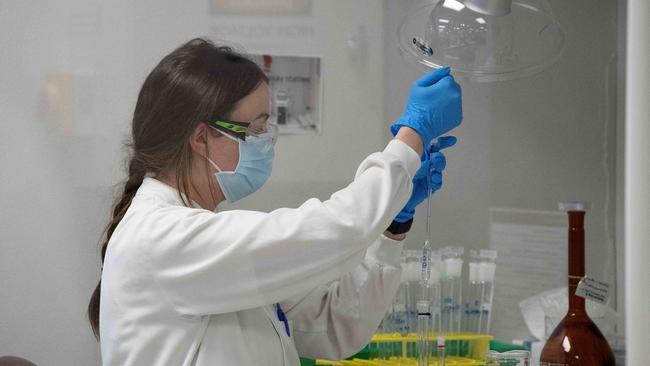
Coronavirus
Don't miss out on the headlines from Coronavirus. Followed categories will be added to My News.
Queensland’s opposition has slammed the Premier’s plan to shift quarantine responsibilities to mining camps, accusing Annastacia Palaszczuk of wanting to dump the continued coronavirus threat on regional communities.
Ms Palaszczuk said on Thursday morning she would ask national cabinet to consider housing returned travellers and quarantine staff at mining camps to protect the Sunshine State’s cities following the outbreak of the highly contagious UK strain at the Hotel Grand Chancellor in Brisbane.
But David Crisafulli said the plan didn’t solve the failure to contain the deadly virus.
“Something is wrong with our quarantine process. The virus got out. They don’t know how,” the Opposition Leader told NCA NewsWire.
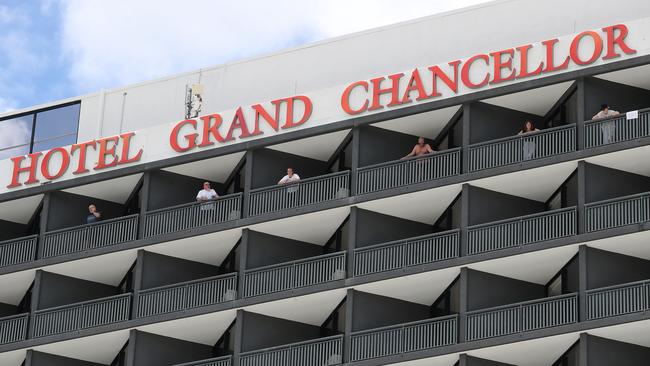
“And today, their solution is to pick up the problem and dump it somewhere in regional Queensland.
“They’re not solving the problem, they’re moving it.”
Mr Crisafulli said the system needed to be “watertight”.
“It doesn’t matter if people are being held in a hotel room in Brisbane or a mining camp in Moranbah, it’s the same problem,” he said.
“Right now it isn’t working, and that worries me.”
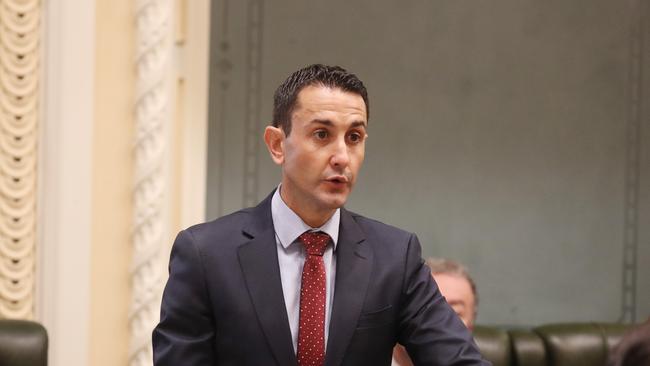
Queensland health authorities are scrambling to trace the source of the outbreak as police sift through security footage from the Brisbane hotel, with the investigation so far failing to reveal how a hotel worker became infected and exposed hundreds of people in the community to the deadly strain.
“Queenslanders deserve to know what went wrong so we can be assured this doesn’t happen again,” Mr Crisafulli said.
“That’s especially true for regional Queenslanders given this problem could now be coming to their backyard.”
Ms Palaszczuk told reporters on Thursday morning the pitch to set up quarantine sites at mining camps was aimed at reducing the threat at hotel quarantine facilities in Brisbane and Gold Coast CBDs.
“I think this is a rational option, and if we are dealing with a strain which is up to 70 per cent more infectious, I think we need to be really serious about it,” she said.
“I have asked (chief health officer) Dr Young and the health minister and the commissioner and her team to go and look at some options for the government to consider.”
Ms Palaszczuk said some of the camps were “four star” quality and would have fresh air for guests.
There would also be capacity for all the staff and cleaners to be based on site as well.
VICTORIA RECORDS ZERO NEW CASES
Victoria has recorded zero new locally acquired cases of coronavirus on Thursday as more than 16,000 people were tested in the past 24 hours.
The Department of Health and Human Services also revealed no new infections in returned overseas travellers in hotel quarantine.
There are 29 active cases of COVID-19 across the state. There were 16,533 tests undertaken in the past 24 hours.
There are now more than 200 testing centres in operation in Victoria, including a new testing site near gate one at the MCG.
Almost 200,000 tests have been taken in Victoria since the start of the year.
Face masks will also no longer be mandatory in all indoor spaces across Victoria, following the state’s eight straight day of no new local cases of coronavirus.
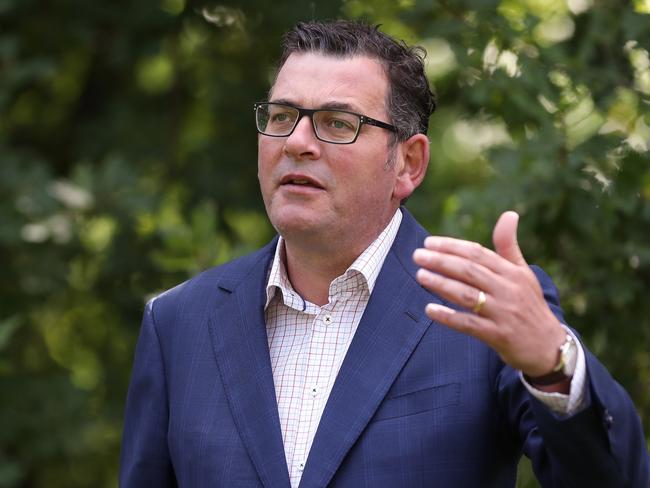
Victorian Premier Daniel Andrews announced on Thursday masks will only be mandatory on domestic flights, at airports, in hospitals, on public transport, in commercial vehicles and at other retail locations.
He also said a number of Victorians in hotel quarantine in Queensland were being contacted and retested for the UK coronavirus strain after returning to Victoria since December 30.
The Premier said as a result of the COVID-19 fears plaguing Queensland, he said 18 people who had quarantined in Brisbane’s Hotel Grand Chancellor and then returned to Victoria since December 30 will be followed up.
“We are contacting them. We are testing them. Some of them will need to isolate. Some will simply need to get a negative test,” he told reporters on Thursday.
“There’s a specific window where we believe there is some chance that because of the infections that have already been recorded in hotel quarantine, between staff and residents, and it is that UK strain, without any other link … circumstances are very much based on each person’s travel movements and when they were in hotel quarantine.”
NO NEW CASES IN NSW; REGIONAL QUARANTINE PLAN REJECTED
The NSW government has ruled out moving coronavirus quarantine hotels to regional areas, the state’s health minister says.
It comes as the state recorded no new local cases of COVID-19 for the first time since January 6.
The comments from Brad Hazzard came after the Queensland Premier revealed her government was considering turning rural mining camps into quarantine facilities.
Annastacia Palaszczuk said such a plan would be a “rational option” given a new, more contagious strain of coronavirus had entered Australia and spread in the Brisbane community.
But NSW authorities would not follow suit, Mr Hazzard said.
“This has been looked at very closely by the NSW public health team over the full duration of this particular pandemic,” he said.
“There’s strong views held in our public health team it makes sense to continue to have the hotel quarantine arrangements we currently have.”
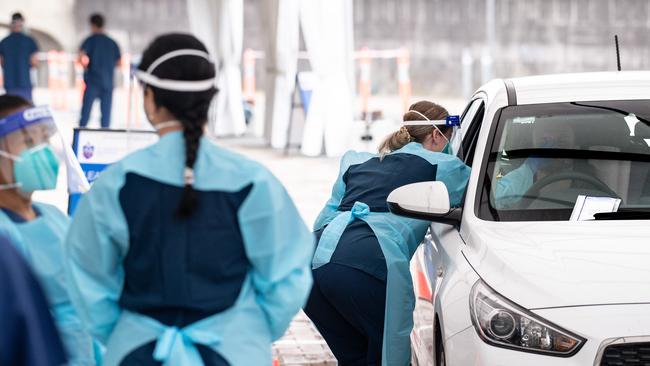
He said the main concerns were around transporting arriving overseas travellers to the regions, which might pose a risk of spreading the virus in transit.
Authorities also want to be able to quickly transfer a patient whose condition deteriorates to a major hospital, something that would be harder to do if the quarantine facilities weren’t located in Sydney.
‘RESULTS WERE 70PC’: HEALTH CHIEF STANDS BY AUSSIE VACCINE
Australia’s chief medical officer Paul Kelly on Wednesday defended the decision to roll out the AstraZeneca vaccine in the wake of concerns about its effectiveness.
Infectious diseases experts have joined medics in calling for authorities to halt the rollout in favour of coronavirus vaccines with higher efficacy rates to ensure herd immunity.
This follows results from several trials that showed that the Oxford University-AstraZeneca jab had an efficacy rate of between 62-90 per cent depending on the doses.
But Professor Kelly told Sky News it was a high quality vaccine that was effective and safe.
“I am worried when some people come out strongly in this way with a small amount of information,” Professor Kelly told Sky News.
“The pooled results were 70 per cent. That well exceeds what the World Health Organisation sees as the minimum efficacy (50 per cent) required for vaccination.”
The Therapeutic Goods Administration (TGA) is expected to approve the Pfizer vaccine by the end of January, with a rollout pencilled for mid to late February for five million Australians in priority groups.
The AstraZeneca vaccine is expected to have completed the approval process in February.
Professor Kelly said the jab would prevent death and severe illness 100 per cent of the time, like the Pfizer vaccine.
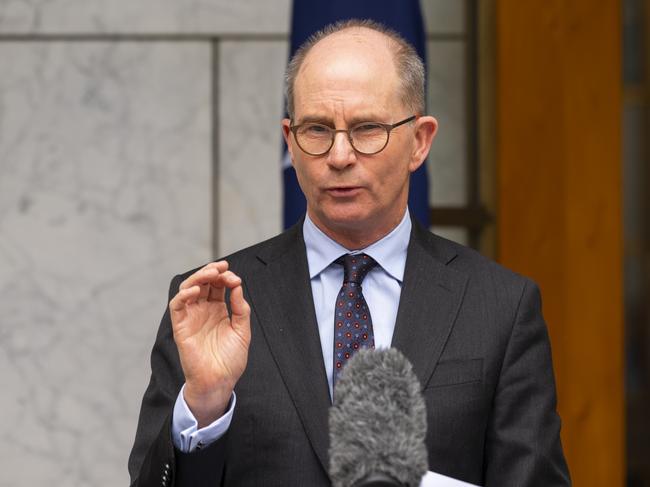
He said both vaccines would only be rolled out if they had the full tick for safety, efficacy and production quality.
“We are not alone in the world for choosing AstraZeneca,” he said, adding the UK was immunising people with the jab under emergency approvals.
Most Australians are expected to get the AstraZeneca vaccine because it can be made in Melbourne, unlike the Pfizer vaccine that has to be imported from overseas due to its mRNA technology.
Health Minister Greg Hunt on Tuesday refuted claims the government was conceding its vaccine strategy would not provide herd immunity.
“This is what the medical expert panel of Australia, the one that has helped keep us safe, has recommended,” Mr Hunt said.
In the wake of efficacy concerns, Labor leader Anthony Albanese told 2GB that the government should have invested in six vaccine candidates instead of three.
The opposition has long called for the rollout of the vaccine to be brought forward following the approval process.
But Mr Albanese said the party had never argued that authorities should circumvent the TGA process.
“We need to listen to the experts,” he said.
“Once it (the TGA) approves it, the vaccine should be rolled out.”
SCIENTISTS CALL FOR PAUSE ON AUSSIE VACCINE
Herd immunity against COVID cannot be achieved in Australia with the lower-efficacy Oxford-AstraZeneca vaccine, which the Morrison government plans to administer to millions of Australians, according to leading doctors.
Medics and infectious disease experts are calling for Australia to invest in more high-efficacy vaccines, rather than relying on the AstraZeneca jab.
Australia has ordered 53.8 million doses of the AstraZeneca vaccines which has been shown in trials to have a much lower level of efficacy than Pfizer and Moderna vaccines being injected in Britain, France, Israel and the US, The Australian reports.
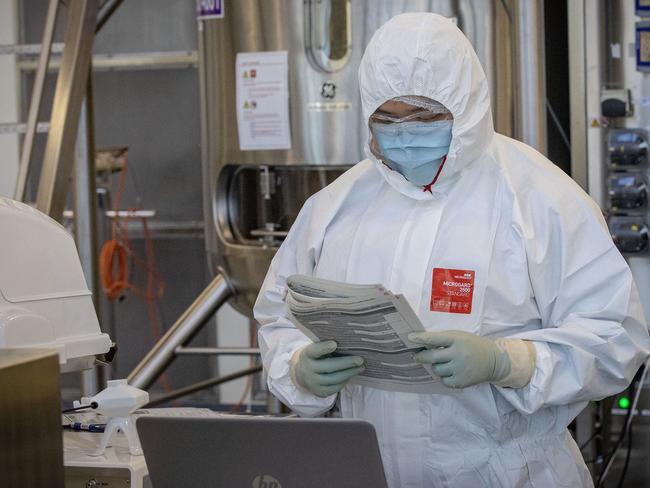
The head of the AMA in Western Australia, anaesthetist Andrew Miller, said the government should shelve its plans to begin vaccinating the population with the AstraZeneca vaccine from March.
“We need to pause and look at what the outcomes are going to be before we take any further steps,” Dr Miller said.
“With the AstraZeneca vaccine, on current data, if we rely on that vaccine we’re not going to get to herd immunity. Current expectation is we’re going to be able to get back to normal life, but if we don’t get herd immunity there’s no guarantee that we won’t have rolling epidemics.
“Once you have one vaccine, you may not be able to have other ones. That’s why it’s very important to get it right the first time.”
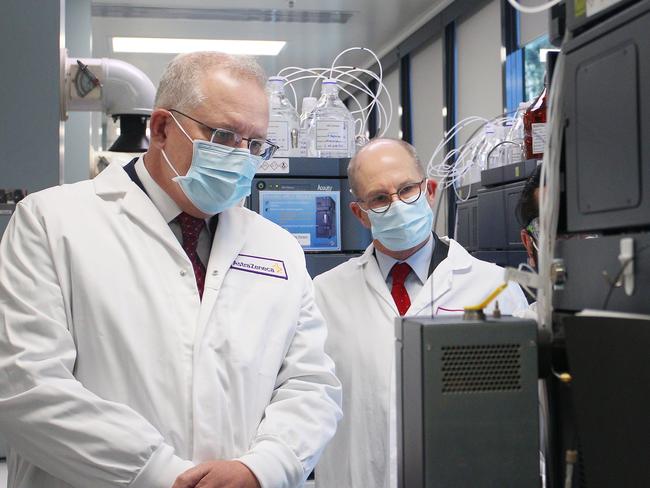
Infectious diseases physician and professor at Monash University Michelle Ananda-Rajah said Australia should be “going for broke” to achieve herd immunity with the Pfizer and Moderna vaccines.
“I feel like Australia is short-changing itself by betting so heavily on the AstraZeneca vaccine,” Dr Ananda-Rajah told The Australian.
“I haven’t had any clarity from the government as to what the end game here is. In my mind, the end game for Australia is we should be aiming to eliminate COVID-19.
“Here we have the opportunity to do that because we have two highly efficacious vaccines at our disposal, Pfizer and the Moderna, and we have a population that more or less is willing to be vaccinated. Herd immunity is the prize and we should be going for broke.
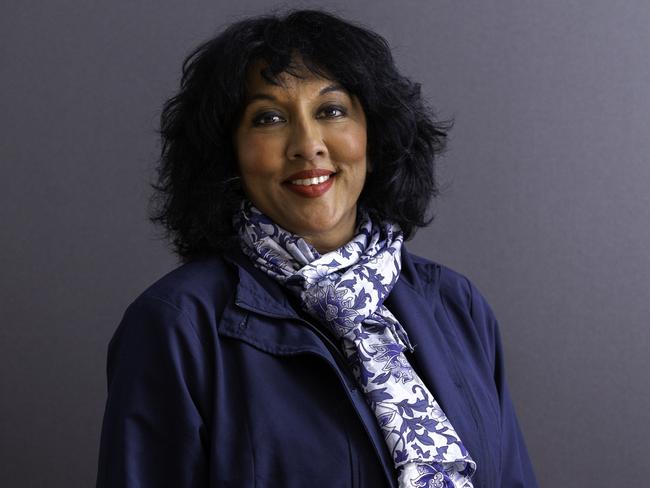
“So I want the government to step up and pivot, change strategy and procure more of the highly efficacious vaccines.”
The AstraZeneca vaccine has been shown in trials to have an efficacy rate of 62 per cent, determined 14 days after the second dose in a two-dose regimen. Efficacy was 90 per cent in a subgroup of volunteers who by mistake received a half-dose for their first jab in phase 3 clinical trials.
The Pfizer vaccine has an efficacy rate of 95 per cent and Moderna’s is 94 per cent.
Raina MacIntyre, the head of the biosecurity program at the University of NSW’s Kirby Institute, said Australia would not achieve herd immunity if most people in the community received the ordinary dosage regimen of the AstraZeneca vaccine.
“This vaccine is unlikely to be able to achieve herd immunity,” Professor MacIntyre said. “You’re not going to have enough people immune. Even if everyone’s vaccinated, we’ll still have the virus circulating because its efficacy is not high enough.”
Health Minister Greg Hunt lashed out at Professor MacIntyre, suggesting her past predictions on coronavirus case numbers and deaths had proved wildly inaccurate. He said there were practical issues with the fact the Pfizer vaccine had to be stored at minus 70C.
NSW
Visitors or residents of NSW who have been to Brisbane will be made to self-isolate, officials have announced.
The move came after Queensland announced a three-day lockdown of Brisbane, which will begin at 6pm Friday.
NSW will make anyone who has been in Brisbane, Logan, Ipswich, Moreton Bay, and Redlands from January 2 self-isolate.
FACE MASKS
A $200 on the spot fine will apply if you do not comply with the requirements to wear a face mask.
Children aged 12 and under are exempt but are encouraged to wear masks where practicable.
Places where face masks must be worn
You must wear a face mask indoors when you enter or work at
*retail or business premises that provides goods or services to the public including
*supermarkets
*shopping centres
*banks
*post offices
*hairdressers.
*residential aged care facilities (visitors, not residents).
Premises that are used for the purpose of providing health services are not retail premises or business premises.
Face masks are also mandatory when you are using public transport or are a passenger in a taxi or rideshare vehicle when you are waiting at a public transport waiting area (such as a bus stop, train platform or taxi rank) for all staff in hospitality venues and casinos for patrons using gaming services.
SOUTH AUSTRALIA
From midnight Friday January 8, anyone coming into SA from greater Brisbane will be required to quarantine for 14 days.
SA Premier Steven Marshall announced a hard border closure to NSW on January 1.
He said there will be few exemptions for those returning after 12.01am on Friday, but SA residents, people permanently moving states and essential travellers will be permitted.
All those groups will still need to self-isolate for 14 days.
Travellers returning to the state will need to demonstrate they met the criteria upon crossing the border.
He said people travelling from Queensland to South Australia must follow the most direct route through NSW and not spend “unnecessary time” interstate.
Mr Marshall said a 100km buffer zone will be implemented for cross-border communities, allowing people in Broken Hill and Wentworth to freely enter the state.
“We’re also going to be putting some transit allowances because there are people travelling through NSW who won’t be stopping,” Mr Marshall said.
Mr Marshall said border arrangements with Victoria would not change.
VICTORIA
Victoria introduced a border permit system on Monday, January 11.
The traffic light-style system permits travel from “green zones” (no quarantine required) and “orange zones” (travellers required to be tested for COVID-19 within 72 hours of arrival and isolate until they receive a negative result).
You are not allowed to travel to Victoria if you are from a “red zone” — presently, Greater Brisbane, and Greater Sydney including Wollongong and the Blue Mountains.
You can find out more here.
NORTHERN TERRITORY
The NT declared Greater Metropolitan Sydney a COVID-19 hotspot from midnight on New Year’s Eve, meaning anyone travelling from there must enter quarantine.
The NT had previously declared only seven Sydney suburbs hot spots.
QUEENSLAND
Queensland, which had already declared Greater Sydney a hotspot, is assessing the situation as it unfolds.
Chief health officer Dr Jeannette Young said on Thursday she was closely monitoring the New South Wales cluster and the new Victorian cases.
“I’m urging Queenslanders travelling to these states to reassess their plans – if it is not necessary, then consider staying here,” she said.
“The next 24 hours are critical for Victoria and the NSW cluster is growing daily. Queensland is in a good position right now because we acted quickly to declare greater Sydney a hotspot.”
WESTERN AUSTRALIA
Western Australia has introduced a hard border with Queensland, which will take effect from midnight on Friday, January 8.
Western Australia has already shut its border to NSW travellers but on Thursday said it will close to Victorian travellers too.
From 12.01am on January 1, only exempt Victorian travellers will be allowed into WA, while returning residents must self-isolate for two weeks.
Anyone who arrived in WA from Victoria on or after December 21 must also self-quarantine for 14 days.
TASMANIA
Tasmania has declared nine Victorian sites as high-risk COVID-19 areas including restaurants, clubs, churches, shopping centres, hotels, and bars.
People in Tasmania who have visited are asked to self-isolate and contact the public health line on 1800 671 738.
Non-Tasmanians who have been in the areas in the specified times cannot enter Tasmania without an exemption.
It has measures in place requiring travellers from Greater Sydney to quarantine.
More details on travel alerts here.
AUSTRALIAN CAPITAL TERRITORY
Non-ACT residents are banned from entering the territory if they have travelled from hot spots, unless granted an exemption. That means all nonresidents who have been in Greater Sydney, the Central Coast or Wollongong local government areas will be refused entry at the border.
ACT residents have to sign an online declaration form before returning then quarantine for 14 days.
– with NCA NewsWire




